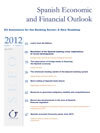EU Assistance for the Banking Sector: A New Roadmap
Fecha: 2012
Spanish and International Economic & Financial Outlook, SEFO, V. 1 N.º 2
Sumario
[expand title= "Resolution of the Spanish banking crisis: Implications of recent developments "]- There has been some recent progress in the resolution of the banking crisis in Spain through four major developments. First, the Eurogroup agreed on setting up contingent aid for the recapitalization of Spanish banks for 100 billion euros. Second, two well-known consulting
firms performed the first independent valuation of Spanish banks’ capital needs. Third, the Eurozone members took some very relevant decisions during their June 28th-29th meeting that could potentially alleviate market pressures on Spanish banks by defining a more streamlined approach for channeling the recapitalization of banks in the Eurozone. Some of these changes point to a European banking union in the near future. And finally, the Memorandum of Understanding (MoU,) with the conditions set for European financial aid for Spanish banks, has also been released on July 20th.
- Leer más
- Two major economic imbalances in Spain are the size of its negative financial position versus the rest of the world and its high level of external debt. A large part of Spain’s financing comes from banks in third countries and the effects of the crisis have led to increased capital
flight. Three main lessons can be drawn from this crisis. First, the stigma of a bailout causes increased capital flight by foreign banks. Second, increasing financial markets globalization and integration demand global responses. Third, European banks reduced more their capital exposure to other euro-area partners, undermining confidence and deviating from the path of financial integration. To prevent further deterioration of the current situation and capital flight, the Spanish authorities should push forward reforms to restore confidence and continue working with their European partners in constructing a more integrated European financial market.
- Leer más
- Spain’s high levels of private debt, in particular bank debt, together with increased public debt levels, is making it extremely difficult for Spanish banks to tap wholesale funding marketscurrently their main source of funding. Such difficulties have essentially led banks, and to an
even greater degree cajas, to rely on shorter-dated, secured debt instruments. However, in the actual context of greater risk aversion for peripheral Eurozone countries, only the Spanish Treasury is successfully able to raise money in the primary market. Temporary ECB liquidity
support measures have provided some necessary breathing space for the Spanish financial system. But, Spanish credit institutions must recover the confidence of the markets and come back to traditional funding channels in order to reduce their heavy dependence on Eurosystem liquidity.
- Leer más
- Bank share prices have been particularly hit in recent months, especially in those countries, like Spain, where the fate of banks and that of public finances is more closely related, such that speculating against bank shares is seen as a proxy for speculation against sovereign
debt. These types of transactions are especially amplified by “short sales”, which have a great potential to destabilize normal price setting in stock markets, especially in those sectors, such as the financial sector, facing strict capital requirements. This explains why several countries, among them Spain, imposed temporary bans on short selling of bank shares. In the case of Spain, the effect of that ban has been a decrease in volatility and asymmetry in price formation, while at the same time reducing considerably market liquidity.
- Leer más

